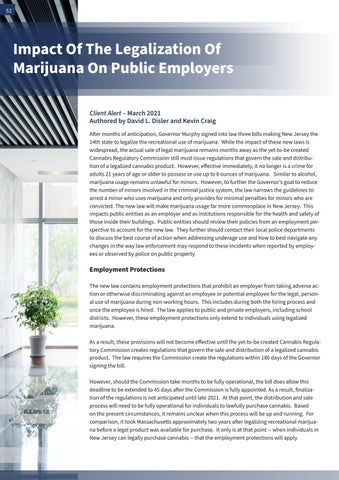52
Impact Of The Legalization Of Marijuana On Public Employers Client Alert – March 2021 Authored by David L. Disler and Kevin Craig After months of anticipation, Governor Murphy signed into law three bills making New Jersey the 14th state to legalize the recreational use of marijuana. While the impact of these new laws is widespread, the actual sale of legal marijuana remains months away as the yet-to-be created Cannabis Regulatory Commission still must issue regulations that govern the sale and distribution of a legalized cannabis product. However, effective immediately, it no longer is a crime for adults 21 years of age or older to possess or use up to 6 ounces of marijuana. Similar to alcohol, marijuana usage remains unlawful for minors. However, to further the Governor’s goal to reduce the number of minors involved in the criminal justice system, the law narrows the guidelines to arrest a minor who uses marijuana and only provides for minimal penalties for minors who are convicted. The new law will make marijuana usage far more commonplace in New Jersey. This impacts public entities as an employer and as institutions responsible for the health and safety of those inside their buildings. Public entities should review their policies from an employment perspective to account for the new law. They further should contact their local police departments to discuss the best course of action when addressing underage use and how to best navigate any changes in the way law enforcement may respond to these incidents when reported by employees or observed by police on public property
Employment Protections The new law contains employment protections that prohibit an employer from taking adverse action or otherwise discriminating against an employee or potential employee for the legal, personal use of marijuana during non-working hours. This includes during both the hiring process and once the employee is hired. The law applies to public and private employers, including school districts. However, these employment protections only extend to individuals using legalized marijuana. As a result, these provisions will not become effective until the yet-to-be created Cannabis Regulatory Commission creates regulations that govern the sale and distribution of a legalized cannabis product. The law requires the Commission create the regulations within 180 days of the Governor signing the bill. However, should the Commission take months to be fully operational, the bill does allow this deadline to be extended to 45 days after the Commission is fully appointed. As a result, finalization of the regulations is not anticipated until late 2021. At that point, the distribution and sale process will need to be fully operational for individuals to lawfully purchase cannabis. Based on the present circumstances, it remains unclear when this process will be up and running. For comparison, it took Massachusetts approximately two years after legalizing recreational marijuana before a legal product was available for purchase. It only is at that point -- when individuals in New Jersey can legally purchase cannabis -- that the employment protections will apply



















